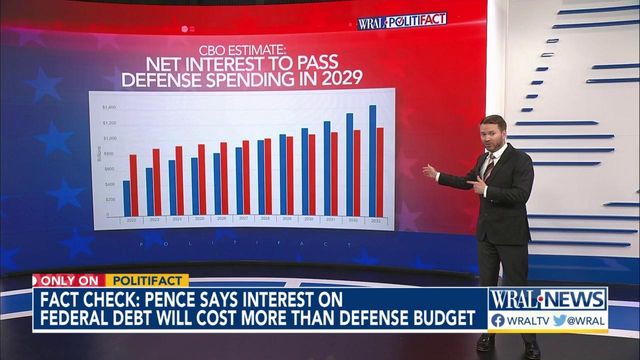Fact check: Will interest on the federal debt soon cost more than national defense?
As House Republicans prepare to battle President Joe Biden and congressional Democrats over federal spending, former Vice President Mike Pence — a potential presidential candidate in 2024 — offered a comparison to illustrate how the government spends its money.
"In the next two years, we'll spend more on interest on our national debt than we do on the national defense," Pence told CNN’s Wolf Blitzer in a March 30 interview. "I have to tell you, for our national security, for our nation's well-being, we have to begin a conversation about common sense, compassionate reform."
The U.S. is getting to the point where debt service exceeds military spending, but it’s not there quite yet.
We turned to the most recent Budget and Economic Outlook released by the Congressional Budget Office, the nonpartisan congressional arbiter for federal spending.
We looked at two commonly used statistics. One is net interest, the interest the government pays bondholders to finance its existing debt, minus what the government receives in interest payments. The other statistic is defense spending.
The CBO’s analysis, which was published in February 2023, is useful because it looked at figures for interest and defense spending in a single report, making it the most apples-to-apples comparison.
In its report, the CBO projected that net interest on the federal debt will exceed defense spending — but that will occur for the first time in fiscal year 2029, not during either of the next two fiscal years, as Pence had said.
For fiscal year 2023 (which runs through the end of September 2023), CBO projected net interest to be $640 billion, which was less than the $891 billion allocated for defense. For fiscal year 2024, the figures were $739 billion for net interest and $922 billion for defense.
The first year that net interest is projected to exceed defense spending, according to CBO, is fiscal year 2029. That year, net interest is projected to total $1.07 trillion and defense spending is projected at $1.04 trillion. Net interest is projected to exceed defense spending for each of the subsequent fiscal years for which CBO offered projections: 2030, 2031, 2032 and 2033.
Meanwhile, we also looked at the White House’s proposed budget for fiscal year 2024. This budget is highly unlikely to be fully enacted, but it provides a sense of what Biden would like to put in place.
Using these numbers, defense also outpaces net interest until the figures reverse in fiscal year 2029.
This is also true if a more limited definition of defense spending is used — one that excludes funds such as those for nuclear weapons maintenance that are officially categorized under the Energy Department’s budget.
Pence’s team told PolitiFact that such analyses may be understating matters, possibly in two ways.
First, the CBO report says that "discretionary funding in future years is assumed to equal the amount provided so far for 2023." However, Pence’s team said this does not include additional items Biden would like to enact, such as student loan write-offs. Although none of these proposals are guaranteed to pass (and the student loan plan may be blocked by the courts), changes like these could increase net interest costs unless they are fully paid for with tax increases.
Second, Pence’s team said that if inflation fails to drop as quickly as the CBO projects, that would also raise net interest costs.
However, both of these propositions are speculative. All figures of this sort are projections subject to change. But the CBO’s estimate, which is the most widely accepted, says the day Pence foresees won’t come as soon as he suggests it will.
PolitiFact ruling

Pence said, "In the next two years, we'll spend more on interest on our national debt than we do on the national defense."
CBO projections from February 2023 show that net interest is projected to exceed defense spending starting in fiscal year 2029, but not in the next two years. This analysis provides the most apples-to-apples comparison.
It’s possible to envision scenarios that would speed up that date, but doing so would be speculative.
We rate the statement Half True.












